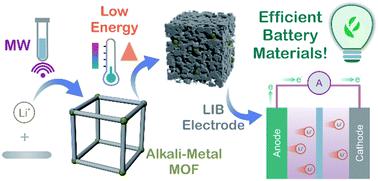Our official English website, www.x-mol.net, welcomes your feedback! (Note: you will need to create a separate account there.)
Conversion of a microwave synthesized alkali-metal MOF to a carbonaceous anode for Li-ion batteries
RSC Advances ( IF 3.9 ) Pub Date : 2020-4-3 , DOI: 10.1039/d0ra01997f Aamod V Desai 1 , Vanessa Pimenta 1 , Cara King 1 , David B Cordes 1 , Alexandra M Z Slawin 1 , Russell E Morris 1, 2 , A Robert Armstrong 1
RSC Advances ( IF 3.9 ) Pub Date : 2020-4-3 , DOI: 10.1039/d0ra01997f Aamod V Desai 1 , Vanessa Pimenta 1 , Cara King 1 , David B Cordes 1 , Alexandra M Z Slawin 1 , Russell E Morris 1, 2 , A Robert Armstrong 1
Affiliation

|
Hierarchical carbon-rich materials have shown immense potential for various electrochemical applications. Metal–organic frameworks (MOFs) are well suited precursors for obtaining such templated carbon matrices. Usually these conversions are carried out by energy intensive processes and lead to the presence of toxic transition metal residues. Herein, we demonstrate the green, scalable, microwave-assisted synthesis of a three-dimensional s-block metal based MOF and its efficient transformation into a carbonaceous material. The MOF-derived solid functions as a negative electrode for lithium-ion batteries having moderate low-rate capacities and cycling stability.
中文翻译:

微波合成碱金属 MOF 转化为锂离子电池碳质阳极
多级富碳材料在各种电化学应用中显示出巨大的潜力。金属有机框架(MOF)是获得此类模板化碳基质的非常适合的前体。通常这些转化是通过能源密集型过程进行的,并导致有毒过渡金属残留物的存在。在此,我们展示了三维 s 块金属基 MOF 的绿色、可扩展、微波辅助合成及其向碳质材料的有效转化。MOF衍生的固体可作为锂离子电池的负极,具有适度的低倍率容量和循环稳定性。
更新日期:2020-04-03
中文翻译:

微波合成碱金属 MOF 转化为锂离子电池碳质阳极
多级富碳材料在各种电化学应用中显示出巨大的潜力。金属有机框架(MOF)是获得此类模板化碳基质的非常适合的前体。通常这些转化是通过能源密集型过程进行的,并导致有毒过渡金属残留物的存在。在此,我们展示了三维 s 块金属基 MOF 的绿色、可扩展、微波辅助合成及其向碳质材料的有效转化。MOF衍生的固体可作为锂离子电池的负极,具有适度的低倍率容量和循环稳定性。



























 京公网安备 11010802027423号
京公网安备 11010802027423号